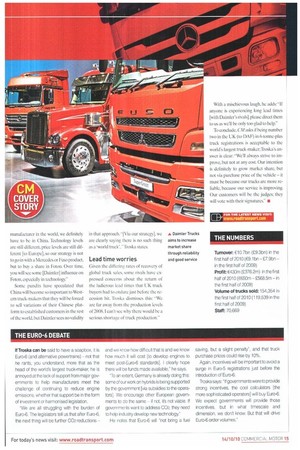THE EURO-6 DEBATE
Page 15

If you've noticed an error in this article please click here to report it so we can fix it.
If Troska can be said to have a soapbox, it is Euro-6 (and alternative powertrains) — not that he rants, you understand, more that as the head of the world's largest truck-maker, he is annoyed at the lack of support from major governments to help manufacturers meet the challenge of continuing to reduce engine emissions, whether that support be in the form of investment or harmonised legislation.
"We are all struggling with the burden of Euro-6. The legislators tell us that after Euro-6, the next thing will be further 002 reductions —
and we know how difficult that is and we know how much it will cost [to develop engines to meet post-Euro-6 standards]. I clearly hope there will be funds made available," he says.
"To an extent, Germany is already doing this: some of our work on hybiids is being supported by the government [via subsidies to the operators]. We encourage other European governments to do the same -if not, Ws not viable. If governments want to address 002, they need to help industry develop new technology."
He notes that Euro-6 will "not bring a fuel saving, but a slight penalty', and that truck purchase prices could rise by 10%.
Again, incentives will be important to avoid a surge in Euro-5 registrations just before the introduction of Euro-6.
Troska says: "If governments were to provide strong incentives, the cool calculators [the more sophisticated operators] will buy Euro-6. We expect governments will provide those incentives, but in what timescale and dimension, we don't know. But that will drive Euro-6 order volumes."




























































































































